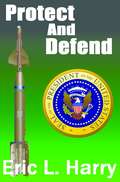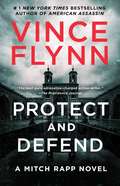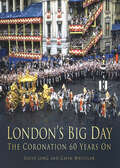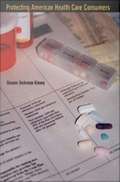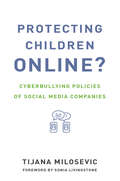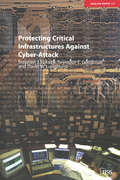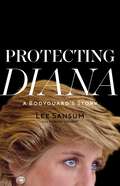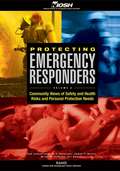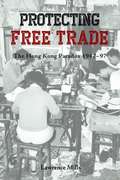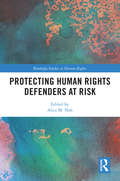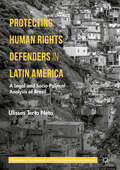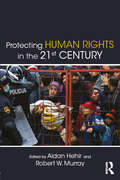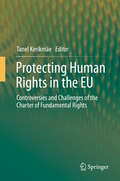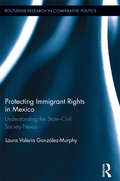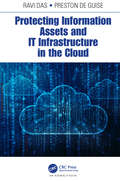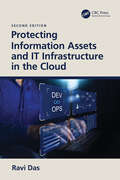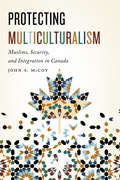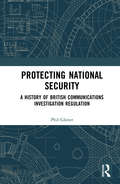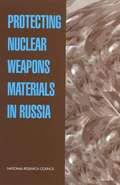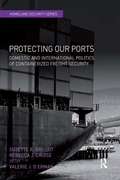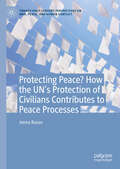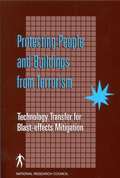- Table View
- List View
Protect and Defend
by Eric L HarryA series of military and political disasters has swept the globe. The Russian government has fallen to anarchists. The Chinese have marched into Siberia and are poised to take the continent. And, in one final master stroke, the newly elected president of the U.S. is assassinated. Now it's up to an untested leader, Vice President Gordon Davis, to step forward and stop it. But with his nation divided, his allies paralyzed, and a small U.S.-U.N force the only thing standing between the Chinese and the rest of Asia, the battle and the war may already be lost."Harry has a first-rate speculative mind well grounded in current science." "The ideas he puts forth, and his knowledge of computing, are extremely engaging." -Kirkus Reviews "A good storyteller...harrowing stuff!"-- New York Times Book Review"Truly an epic, the action switching rapidly all over the globe, cleverly interweaving. A really powerful read." -- Manchester Evening Guardian
Protect and Defend: A Thriller (A Mitch Rapp Novel #10)
by Vince FlynnCounterterrorist agent Mitch Rapp is on a collision course with America&’s most feared enemy in this white-knuckle thriller from &“the best pure adrenaline-charged action writer out there&” (The Providence Journal) and #1 New York Times bestselling author of American Assassin. No longer willing to wait for the international community to stop its neighboring enemy, Israel brings down Iran&’s billion-dollar nuclear program in an ingeniously conceived operation. The attack leaves a radioactive tomb and environmental disaster in its wake, and has Iranian president Amatullah calling for blood—American blood. Seeing opportunity where others fear reprisals, Mitch Rapp devises a brilliant plan to humiliate Iran&’s government and push the nation to the brink of revolution. But when a back-channel meeting between CIA director Irene Kennedy and her Iranian counterpart goes disastrously wrong, Rapp is locked in a showdown with a Hezbollah mastermind in league with Amatullah—and he is given twenty-four hours to do whatever it takes to stop unthinkable catastrophe.
Protect and Keep: The Coronation of Queen Elizabeth II
by David Long Gavin WhitelawThe summer of 2022 saw the celebration of the seventieth anniversary of Queen Elizabeth II’s coronation, the first time in British history that a monarch has reached this remarkable milestone.As the event was the first of its kind to be televised, images from the ceremony inside Westminster Abbey are instantly recognisable. Far less familiar are the scenes in the streets outside, where huge crowds assembled to see a procession of state coaches and historic regiments marching past public buildings festooned with patriotic banners and colourful grandstands erected outside many famous landmarks.Using a private collection of more than 200 rare images of London’s West End, Protect and Keep looks back to the day that the Queen pledged herself to her country. It provides a unique and precious record of an historic occasion: the day of the Coronation as it was seen by ordinary members of the public.
Protected Areas, Sustainable Land?
by Estienne RodaryProtected areas, such as nature reserves, national parks and marine conservation areas, are the main tool of nature conservation policies and are increasing on a worldwide scale. They are one of the main forms of environmental planning, and conservation institutions have increasing means at their disposal. At the same time, the goals of protected areas have become more diverse, with the involvement of more stakeholders and complex institutional frameworks. Giving an account of the extension and diversification of protected areas, this book determines whether these two processes constitute a breakdown in conservation policies. Economists, ecologists, lawyers, anthropologists and geographers analyse the various trends which are fundamental to the future of protected areas to reveal a conflicting scene where narrative around cooperation and integration hides competition between different interests. This book shows how protected areas are emerging as zones of divergent experimentations of sustainable development rather than lasting forms of integrative environmental management.
Protecting American Health Care Consumers
by Eleanor Dearman KinneyDespite the attention to the problem of protecting the health care interests of Americans, there is little consensus on what should be done politically or otherwise to address this problem. In Protecting American Health Care Consumers Eleanor DeArman Kinney, a nationally regarded expert on health policy and law, tackles the serious and ongoing debate among state and federal policymakers, health care providers, third-party payers, and consumers about how to provide procedural justice to patients in the present health care climate. To promote and ensure consumer protection in an increasingly adversarial and complicated health-care culture, Kinney first analyzes the procedures by which consumer concerns are presently discerned and resolved and then explains why these systems are unsatisfactory. She also discusses problematic procedures for making coverage policy and quality standards and proposes reforms in a variety of processes that would enable all consumers, including the uninsured, to influence key policies and standards and also to raise concerns and obtain appropriate remedies. As the first comprehensive treatment of administrative procedures in American health plans and other such institutions, Protecting American Health Care Consumers will be welcomed by state and federal policymakers, managed care executives, and lawyers charged with designing and implementing protections for consumers in public and private health plans.
Protecting Buildings From Bomb Damage: Transfer of Blast-Effects Mitigation Technologies from Military to Civilian Applications
by National Research CouncilThis book provides a brief overview of worldwide terrorist activity and reviews technologies and methods for designing blast resistant buildings. These techniques, primarily developed by the military, have applicability and relevance to the design of civilian structures. The volume recommends that a program of applied research and technology transfer be undertaken to hasten the availability and utility of these techniques to the civilian building community.
Protecting Children Online?: Cyberbullying Policies of Social Media Companies (The Information Society Series)
by Tijana MilosevicA critical examination of efforts by social media companies—including Facebook, Twitter, Snapchat, and Instagram—to rein in cyberbullying by young users.High-profile cyberbullying cases often trigger exaggerated public concern about children's use of social media. Large companies like Facebook respond by pointing to their existing anti-bullying mechanisms or coordinate with nongovernmental organizations to organize anti-cyberbullying efforts. Do these attempts at self-regulation work? In this book, Tijana Milosevic examines the effectiveness of efforts by social media companies—including Facebook, Twitter, YouTube, Snapchat, and Instagram—to rein in cyberbullying by young users. Milosevic analyzes the anti-bullying policies of fourteen major social media companies, as recorded in companies' corporate documents, draws on interviews with company representatives and e-safety experts, and details the roles of nongovernmental organizations examining their ability to provide critical independent advice. She draws attention to lack of transparency in how companies handle bullying cases, emphasizing the need for a continuous independent evaluation of effectiveness of companies' mechanisms, especially from children's perspective. Milosevic argues that cyberbullying should be viewed in the context of children's rights and as part of the larger social problem of the culture of humiliation.Milosevic looks into five digital bullying cases related to suicides, examining the pressures on the social media companies involved, the nature of the public discussion, and subsequent government regulation that did not necessarily address the problem in a way that benefits children. She emphasizes the need not only for protection but also for participation and empowerment—for finding a way to protect the vulnerable while ensuring the child's right to participate in digital spaces.
Protecting Critical Infrastructures Against Cyber-Attack (Adelphi series)
by Stephen LukasikThe threat that is posed by "cyber-warriors" is illustrated by recent incidents such as the Year 2000 "Millennium Bug". Strategies to reduce the risk that cyber-attack poses, at both individual and national level, are described and compared with the actions being taken by a number of Western governments.
Protecting Diana : A Bodyguard's Story
by Lee SansumThis is the story of an ex-Royal Military Policeman, martial arts champion, and expert in close protection who found his way to the top of his profession, protecting the most famous woman in the world, Princess Diana. Through his assignment as protection for Mohamed and Dodi al-Fayed, he became guard and confidante to the Princess of Wales and the young princes, particularly Harry, and in Protecting Diana he details the weeks leading up to her tragic death. By chance, Sansum was not in Diana&’s car the night of the accident, but it still proved to be a turning point in his own life. His career would continue with some glamorous assignments like guarding Nicole Kidman, Tom Cruise, Pelé, and Sylvester Stallone, but his job was far from easy. He also joined the Royal Military Police, where he faced the deadly Irish Republican Army in the "Bandit Country" of South Armagh, before entering the world of private security and operating in hotspots such as Libya and Somaliland. Through protection of Princess Diana and his other high-pressure jobs where lives were at stake, Sansum provides a candid account of quiet strength, and how reading a situation is invaluable to getting out of trouble. He sets the example for achieving personal goals, overcoming trauma, and in doing so, honors one of the most outstanding figures of our age.
Protecting Emergency Responders Volume 2
by Tom Latourrette Brian A. Jackson James T. Bartis D. J. Peterson Ari HouserFirefighters, law enforcement officers, and emergency medical service responders play a critical role in protecting people and property in the event of fires, medical emergencies, terrorist acts, and numerous other emergencies. The authors examine the hazards that responders face and the personal protective technology needed to contend with those hazards. The findings are based on in-depth discussions with 190 members of the emergency responder community and are intended to help define the protective technology needs of responders and develop a comprehensive personal protective technology research agenda.
Protecting Free Trade
by Lawrence MillsProtecting Free Trade is the story of a paradox that both limited and stimulated Hong Kong's post-war economy. In order to preserve its access to open markets, Hong Kong was obligated by international agreements to accept restraints on its exports; and in order to sustain growth, Hong Kong had to subject its largest industry — textiles — to a massive network of restrictions. Protecting Free Trade examines how Hong Kong handled, by negotiation, attempts by developed economies to limit international trade through protective measures. The central argument is that, far from stifling Hong Kong's industry, restrictive international trade agreements became a stimulus for economic success by creating a sellers' market in which Hong Kong was the dominant supplier. The book is also a personal memoir by someone who was deeply involved in policy formulation. Lawrence Mills was deeply involved in many of the critical economic issues that Hong Kong faced in the 50 years leading up to its return to China in 1997. In Protecting Free Trade he tells the inside story of how Hong Kong held on to its vulnerable and volatile role as a global centre of trade, despite the constant pressures to limit its exports, and its sometimes fractious relationships with the UK, the USA, and Europe. He illustrates the political savvy with which negotiators distanced Hong Kong from the UK to gain the support of developing countries as a countervailing force in international trade, but not to an extent that might upset China. He explains why, for the strategic defence of its interests, Hong Kong depended on international trade arrangements and bilateral restraint agreements. Protecting Free Trade also examines the role of the Trade and Industry Departments, which Mills headed, and of their principal advisory boards. It details the bureaucratic systems, including controversial quota controls, that were necessary to give Hong Kong's businessmen stability and room for manoeuvre in fast-evolving markets. Mills also assesses the charge that the department was too close to the constituency that it served.
Protecting Human Rights Defenders at Risk (Routledge Studies in Human Rights)
by Alice M. NahThis book assesses the construction, operation and effects of the international protection regime for human rights defenders, which has evolved significantly over the last twenty years in response to the risks people face as they promote and protect human rights. Drawing upon the experiences of human rights defenders who continue to persevere in their activism in Indonesia, Egypt, Kenya, Mexico and Colombia, this edited collection examines the ways in which formal protection mechanisms by state and civil society actors intersect with self-protection measures and informal protection initiatives by families and friends. It highlights that protection practices are most effective when they are designed to address the specific risks that human rights defenders face (which are gendered and intersectional); reflect how defenders understand ‘risk’, ‘security’ and ‘protection’; and are appropriate for the dynamic socio-political and legal contexts in which defenders operate. This book proposes ways in which the protection of human rights defenders at risk should be reimagined and practised. This book will be a though-provoking guide for students and scholars of politics, international relations, law and human rights, as well as to practitioners engaged in the protection of human rights defenders at risk.
Protecting Human Rights Defenders in Latin America
by Ulisses Terto NetoThis book offers a legal and socio-political analysis of the Brazilian Program for the Protection of Human Rights Defenders. Discussing Colombian, Guatemalan and Mexican experiences, it fills a gap in the literature regarding Latin American public policy by investigating the creation, work, beneficiaries, broader effects, challenges, and effective ways to improve the Brazilian Program.
Protecting Human Rights in the 21st Century (Routledge Studies in Intervention and Statebuilding)
by Aidan Hehir Robert W. MurrayThis book contributes to current debates on the protection of human rights in the 21st century. With the global economic collapse, the rise of the BRICS, the post-intervention chaos in Libya, the migration crisis in Europe, and the regional conflagration sparked by the conflict in Syria, the need to protect human rights has arguably never been greater. In light of the precipitous decline in global respect for human rights and the eruption or escalation of intra-state crises across the world, this book asks 'what is the future of human rights protection?'. Seeking to avoid both denial and fatalism, this book thus aims to: examine the principles at the very foundation of the debate on human rights; diagnose the causes of the decline of liberal internationalism so as to offer guiding lessons for future initiatives; identify those practices and developments that can, and should, be preserved in the new era; question the parameters of the contemporary debate and advance perspectives that aim to identify the contours of future ideas and practices that may offer a way forward. This book will be of much interest to students of humanitarian intervention, R2P, international organisations, human rights and security studies.
Protecting Human Rights in the EU: Controversies and Challenges of the Charter of Fundamental Rights
by Tanel KerikmäeHuman rights are much talked about and much written about, in academic legal literature as well as in political and other social sciences and the general political debate. This book argues that the universality of basic human rights is one of the values of the concept of rights. It points out the risk of a certain "inflation" caused by the current habit of talking so much and so often about human rights and of using them as a basis for claims of various kinds. These rights, their understanding and interpretation may need to become more "purist" to ensure that universal human rights as a concept survive. Another chapter concentrates on the analysis of the frames of "EU protected human rights" from the perspective of effective implementation. Further, the book not only deals with the complicated relations between the EU and international law, but also seeks to show the horizontal effect. To that end, the fears and hopes of the member states and interest groups are categorized and commented on. Lastly, the gaps in theory and practice are addressed, current trends related to implementation are pointed out, and suggestions are made concerning how to make the best out of the Charter.
Protecting Immigrant Rights in Mexico: Understanding the State-Civil Society Nexus (Routledge Research in Comparative Politics)
by Laura Valeria Gonzalez-MurphyThe state-civil society relationship to migration policy is an area both largely unexplored and little understood in current scholarly literature. Laura González-Murphy offers a timely analysis of the changing role played by civil society in the formulation and implementation of government policies in general and migration policy in particular. Using Mexico as her primary case study because of the recent impact of immigrants on its legislation and the historical evolution of its institutions, González-Murphy details the ways that civil society has become a participant in immigration policy changes, including Mexico’s new migration law. Mexico’s experience is also closely compared with countries presently experiencing similar immigration and political dynamics, such as Spain and Italy. The extensive interviews with Mexican civil society actors and government officials that González-Murphy has conducted during the last few years enable her thorough understanding of the state-civil society relationship in Mexico. The book closes with an examination of what the Mexican experience contributes to our understanding of the actors, processes, issues, and obstacles involved in migration policy development. Protecting Immigrant Rights in Mexico will offer scholars as well as policy makers and civil society actors a greater understanding of the domestic and international political issues and constraints that shape immigration policy making and its implementation.
Protecting Information Assets and IT Infrastructure in the Cloud
by Preston de Guise Ravi DasToday, many businesses and corporations are moving their on premises IT Infrastructure to the Cloud. There are numerous advantages to do doing so, including on-demand service, scalability, and fixed pricing. As a result, the Cloud has become a popular target of cyber-based attacks. Although an ISP is often charged with keeping virtual infrastructure secure, it is not safe to assume this. Back-up measures must be taken. This book explains how to guard against cyber-attacks by adding another layer of protection to the most valuable data in the Cloud: customer information and trade secrets.
Protecting Information Assets and IT Infrastructure in the Cloud
by Ravi DasThis book is a second edition. The last one reviewed the evolution of the Cloud, important Cloud concepts and terminology, and the threats that are posed on a daily basis to it. A deep dive into the components of Microsoft Azure were also provided, as well as risk mitigation strategies, and protecting data that resides in a Cloud environment. In this second edition, we extend this knowledge gained to discuss the concepts of Microsoft Azure. We also examine how Microsoft is playing a huge role in artificial intelligence and machine learning with its relationship with OpenAI. An overview into ChatGPT is also provided, along with a very serious discussion of the social implications for artificial intelligence.
Protecting Jess
by Karna Small Bodman&“A wild ride. . . .You won&’t be able to turn the pages fast enough. I loved it! Check it out. Bring popcorn.&”—Tracy Clark, author of the award–winning Cass Raines and Det. Harriet Foster seriesIn the Shadows of Brazil, Where Wealth and Crime Collide, Unfolds a Gripping Tale of Intrigue and Survival White House economist Jessica Tanner is a rising star—young, brilliant, and beautiful. When her boss falls ill, she is sent to Brazil on his behalf to speak at an international conference. What begins as a glamorous work trip, with visions of sun-drenched beaches, quickly spirals into a nightmare of danger and intrigue. Assigned to accompany her is Bill Black, a stoic State Department official tasked with keeping her out of trouble. However, Bill is hiding a secret—he's a CIA agent with a long history in Brazil where his very life is in jeopardy. A year earlier, Black was part of a covert operation to intercept a massive drug shipment in Brazil. When the operation went awry, the drug kingpin&’s brother was killed, and Bill was blamed. Now, the kingpin is hunting for revenge. Bill knows that returning to Brazil could cost him everything—but with a powerful enemy closing in, he must protect Jess while staying one step ahead of those who want him dead.Protecting Jess is a gripping thriller of political intrigue, danger, and high-stakes diplomacy—written by a national security insider who knows the world of espionage and betrayal like no one else.
Protecting Multiculturalism: Muslims, Security, and Integration in Canada
by John S. McCoyIn a post-9/11 sea of social and political discord, one state stands apart. As an increasingly powerful anti-Islamic social movement rises in the West, Canada alone remains a viable multicultural state. Employing survey and statistical data as well as a series of interviews conducted with religious leaders and policy officials, Protecting Multiculturalism explores public safety and security concerns, while pointing out the successes, pitfalls, and sometimes countervailing effects of government measures on Muslims in Canada. Engaging with debates surrounding the cultural accommodation of diverse communities, John McCoy focuses on two inter-related themes at the heart of the crisis of multiculturalism: social integration and national security. Even in Canada, McCoy argues, Muslims can face acute xenophobia and racism, problematic national security practices, inimical politicians, and other troubling warning signs. Yet, despite these challenges, these diverse communities continue to display remarkable resilience. An open-minded and substantive reflection on the day-to-day realities for Muslim communities, Protecting Multiculturalism seeks a way forward for the Canadian multicultural experiment - a future that is marked by dignity and diversity in an increasingly fraught era.
Protecting National Security: A History of British Communications Investigation Regulation
by Phil GloverThis book contends that modern concerns surrounding the UK State’s investigation of communications (and, more recently, data), whether at rest or in transit, are in fact nothing new. It evidences how, whether using common law, the Royal Prerogative, or statutes to provide a lawful basis for a state practice traceable to at least 1324, the underlying policy rationale has always been that first publicly articulated in Cromwell’s initial Postage Act 1657, namely the protection of British ‘national security’, broadly construed. It further illustrates how developments in communications technology led to Executive assumptions of relevant investigatory powers, administered in conditions of relative secrecy. In demonstrating the key role played throughout history by communications service providers, the book also charts how the evolution of the UK Intelligence Community, entry into the ‘UKUSA’ communications intelligence-sharing agreement 1946, and intelligence community advocacy all significantly influenced the era of arguably disingenuous statutory governance of communications investigation between 1984 and 2016. The book illustrates how the 2013 ‘Intelligence Shock’ triggered by publication of Edward Snowden’s unauthorized disclosures impelled a transition from Executive secrecy and statutory disingenuousness to a more consultative, candid Executive and a policy of ‘transparent secrecy’, now reflected in the Investigatory Powers Act 2016. What the book ultimately demonstrates is that this latest comprehensive statute, whilst welcome for its candour, represents only the latest manifestation of the British state’s policy of ensuring protection of national security by granting powers enabling investigative access to communications and data, in transit or at rest, irrespective of location.
Protecting Nuclear Weapons Material In Russia
by National Research Council Staff Office of International Affairs StaffThe management challenge in orchestrating a multitude of DOE headquarters, laboratory, and contractor personnel at about 50 sites in Russia is daunting. Steps are needed to maximize the return on U.S. expenditures, to reduce redundancy while ensuring adequate oversight, and to provide additional work incentives that will attract highly qualified specialists from the United States and Russia to participate in the protection, control, and accountability of direct-use material (MPC&A) program. This report contains many recommendations to address these and related issues.
Protecting Our Ports: Domestic and International Politics of Containerized Freight Security (Homeland Security)
by Suzette R. Grillot Rebecca J. CruiseSince the terrorist attacks of September 11, 2001, there has been much discussion of the security of borders and ports of entry in the United States and around the world. Ports of entry, particularly sea ports, are viewed as one of the most defenceless targets for a terrorist attack. In response to this perceived vulnerability, a number of port security initiatives have been implemented both on both a domestic and international level. This timely project investigates a number of issues surrounding the container security issue. It examines the scope of containerized freight security, analyzes cooperation between agents in the United States and abroad, explores the politics of port security, and provides an assessment of 17 of the world's sea ports. The work sheds light on the container security threat and the domestic and international responses that have emerged, as well as those steps that still must be taken.
Protecting Peace? How the UN’s Protection of Civilians Contributes to Peace Processes (Twenty-first Century Perspectives on War, Peace, and Human Conflict)
by Jenna RussoOver the last twenty years, the protection of civilians (POC) has become central to the mandates of multidimensional peacekeeping operations, elevated as a core issue on the Security Council’s agenda, and designated as a priority among mandated tasks. This prioritization is based in part on assumptions that POC is a critical enabling factor to achieve peace and that it contributes to the durability of peace. However, the truth of these assumptions remains untested. In this illuminating study, Jenna Russo explores the relationship between violence against civilians and peace, including whether such violence lengthens conflict duration or undermines the prospects for longer-term peacebuilding. Using a mixed-methods approach, including case studies on South Sudan and the Democratic Republic of the Congo, she then examines the extent to which UN POC activities are able to protect civilians from violence and mitigate the potential negative impact it has on peace. This book contributes to both academic and policy debates around the effectiveness of peacekeeping and the protection of civilians, as well as academic research related to conflict duration and the effects of violence.
Protecting People and Buildings from Terrorism: Technology Transfer for Blast-effects Mitigation
by Committee for Oversight Assessment of Blast-effects Related ResearchConcerned with the vulnerability of U. S. civilian and military personnel to terrorist bombing attacks, the U. S. Congress directed the Department of Defense to undertake a comprehensive research and testing program aimed at protecting people in buildings from such attacks. The Blast Mitigation for Structures Program (BMSP) was initiated in 1997 and has produced a large volume of experimental and analytical data that will permit the design of new, more robust buildings as well as the development of methods to retrofit a large number of vulnerable existing structures. This report reviews the BMSP program and investigates a process that would use existing institutional infrastructures (i. e. , building code and standards-writing organizations, professional and technical organizations, universities, and research centers) to disseminate knowledge.
